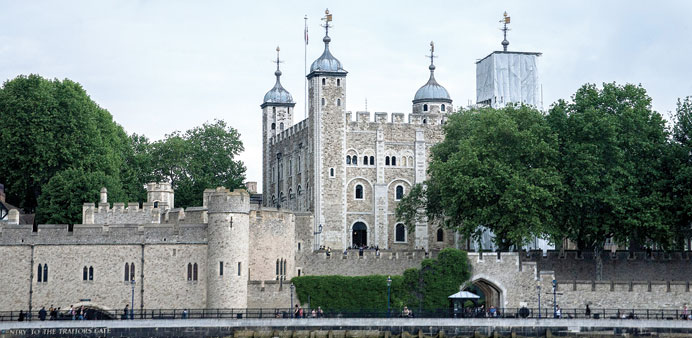The London Pass & the Oyster Card help you make the most of your visit to the city during the high season. By Anne Z Cooke
What’s the only downside to the VIP secret called the London Pass? The wrath of your fellow travellers when they see you jumping the line at visitor sites like the Tower of London.
Take the balding man at the gate, mopping his face. When I stepped in front of him — politely, of course — he frowned, yanked up his shorts and puffed out his chest. “Sorry, miss, but you’ll have to wait your turn,” he growled. “The end of the line is way back there, around the corner.”
I didn’t bother to look at the block-long queue of weary sightseers shuffling over the hot pavement. I’d seen them already. Now I was thanking my lucky rabbit’s foot I’d planned ahead.
“See, uh, this is my London Pass,” I explained, showing him my shiny blue-and-yellow plastic card. “I bought it way ahead of time and it gets me in without a reservation and without waiting. It’s good for dozens of places you probably want to see. Like the Churchill War Rooms, Windsor Castle and Westminster Abbey. It’s a good deal,” I added, babbling apologetically.
To prove the point, I showed him the book that came with the pass, a guide so useful I’d already abandoned the travel guide I’d lugged across the Atlantic. “And here’s my Oyster Card,” I said, whipping it out, figuring that if one travel boost was good, two were better.
“The Oyster Card is a prepaid bus and subway pass costing about half of the price of tickets bought in cash at the station. You can jump on any bus or tube train and go from one end of London to the other, and you can buy the Oyster Card at any train or tube station, or at a London tourism office, or at the Visit Britain website,” I said, running out of breath.
“No kidding,” he said, peering at both cards as if we were playing black jack and I was dealing. “We just arrived yesterday. Whaddaya think? Should we invest?”
I could have launched into the pros and cons, but it seemed more politic to smile and retreat into the Tower’s inner courtyard, a lot safer now than it was when Ann Boleyn and her ilk came to stay and lost their heads.
I could have explained that if you’re in London for just a day or two, buying a pass might not make sense. Walking through Hyde Park, window shopping on Picadilly and watching the Changing of the Guards at Buckingham Palace are outdoor thrills. And the London Pass, while discounted, isn’t free. A one-day adult pass costs $82 (£49).
But the real value of the pass isn’t the money you’ll save. It’s that the pass opens every door, literally, taking all the hassle out of touring a major world city in high season. With the pass in hand you can go to the head of the line at every attraction, castle and museum, and be admitted on the spot. No waiting in line for hours, no changing money. And if you’re a go-getter, sightseeing all day, the pass does save money.
As for the Oyster Card, you’ll need it, too, to get to those river boats and stadium tours. The tube will get you there in quick time; the bus provides leisurely above-ground sightseeing. Tube stations are in walking distance of everything, the employees are helpful, routes are well marked and touching the card to the electronic reader instantly opens the turnstile.
The bad news is that adult ticket prices to top attractions have soared. The Tower of London charges £19.95; the Churchill War Rooms, his war-time headquarters, charges £14.95; Windsor Castle costs £17.75. These three alone justify buying a one-day pass. Better yet, the pass introduces you to other hidden gems, from museums, galleries and palaces, to sports venues, gardens, the Zoo, Funscape, Ben Franklin’s house, walking and bicycling tours, Windsor Castle, back-stage theatre visits, Thames River cruises, and discounts at restaurants, stores, malls and museum shops.
Visit the Canal Museum, formerly a 19th century ice-storage warehouse on the River Thames. This hidden spot tells the story of the era when trade goods came to London from coastal ports via canal boats. Riding in on the tide, the boats unloaded their cargos at riverside warehouses like the now-museum. Don’t miss Kew Palace, in Kew Gardens, the elegant little gem where mad King George III retreated in summer, sipping tea, fretting about the upstart American colonies and finding solace in the shade of the garden’s rare plants.
Have you seen the Handel House Museum, or the Courtauld Gallery, or All Hallows by the Tower, London’s oldest church, founded in 675AD? I hadn’t. How about the guided tour of the Rock’N’Roll Walk, in Soho and Covent Garden; the tour of Wembly Stadium; the guided bicycle tour; or the hop-on-hop-off Thames River boat ride?
To make the most of both the Oyster Card and the London Pass, I checked off places I wanted to see, and grouped them by neighbourhoods. And I tried to go to the most popular attractions early, to miss the crowds. The shorter the line, the easier it is to cut.

VIP TREATMENT: Use the London Pass to jump the line to beat the summer crowds at the Tower of London (built 1078).
